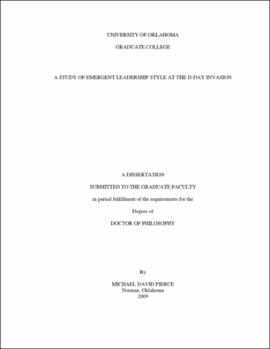| dc.contributor.advisor | Sharp, Susan F. | |
| dc.creator | Pierce, Michael David | |
| dc.date.accessioned | 2019-04-27T21:31:21Z | |
| dc.date.available | 2019-04-27T21:31:21Z | |
| dc.date.issued | 2009 | |
| dc.identifier | 99266397502042 | |
| dc.identifier.uri | https://hdl.handle.net/11244/318896 | |
| dc.description.abstract | Operation Overlord, the Allied invasion of the Third Reich's Fortress Europa, has received considerable historical coverage since it occurred, Moreover, on the 60th anniversary of the Normandy invasion, historians of the U.S. Army's Center of Military History, supplemented by members of the 44thMilitary History Detachment from Fort McPherson, Georgia, plus three other Reserve Military History Detachments, the 49th , the 305th, and the 53rd Military History Detachments interviewed nearly 200 invasion veterans in tents just up the hill from Omaha Beach. Transcriptions and distillations of these interviews yielded considerable historical material that allowed a qualitative study of American leadership in Normandy in late spring 1944. These oral histories reveal that compelling circumstances activated a core set of leadership competency traits in most of the troops. Other postwar leadership theories simply do not apply for Normandy operations. | |
| dc.description.abstract | I observed leadership behaviors applicable when put to the test of real life situations, where making sound and timely decisions in the compacted battle space of the Normandy Beaches and countryside resulted in people living or dying. The measure of this qualitative study was the observations of whether a core of leadership traits, skills, training, and experience or other factors was present in the examples set by those who participated in D-Day. | |
| dc.description.abstract | I hypothesize that a core of leadership competencies emerged in the American troops, regardless of their background, in times of crisis. Using the knowledge gained from both individual and collective histories of the group studied, this study will seek to discover some of the critical factors that enabled leadership to emerge among the participants in the fog of war. | |
| dc.description.abstract | The study revealed that compelling circumstances activated a core set of leadership competency traits in most troops. Based on these results we conclude that there is core of leadership traits that are carried by most people. These findings led to the development of two theories on leadership: Emergent Leadership During Crisis (ELDC) and Emergent Leadership Over Time (ELOT). These two terms describe the process that occurs within individuals as crisis precipitates reaction, based on circumstances of the event, the individual's readiness in terms of trait maturity (the level of development of particular traits needed to act in the situation), and the event itself. | |
| dc.format.extent | 329 pages | |
| dc.format.medium | application.pdf | |
| dc.language | en_US | |
| dc.relation.requires | Adobe Acrobat Reader | |
| dc.subject | World War, 1939-1945--Campaigns--France--Normandy | |
| dc.subject | Operation Overlord | |
| dc.subject | Leadership | |
| dc.subject | Command of troops | |
| dc.title | A STUDY OF EMERGENT LEADERSHIP STYLE AT THE D-DAY INVASION | |
| dc.type | text | |
| dc.type | document | |
| dc.thesis.degree | Ph.D. | |
| ou.group | College of Arts and Sciences::Department of Sociology | |
